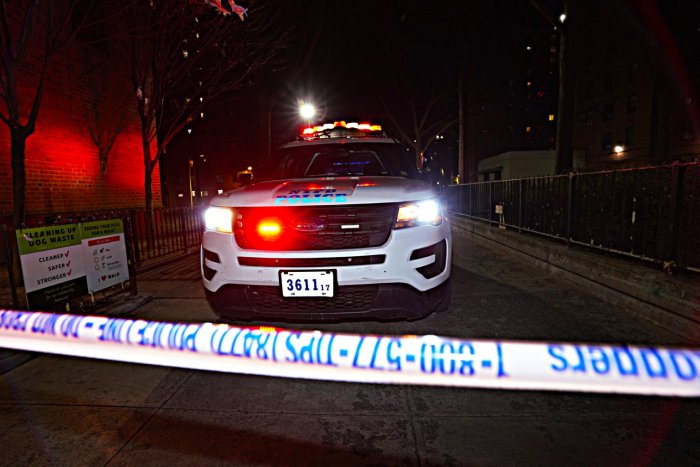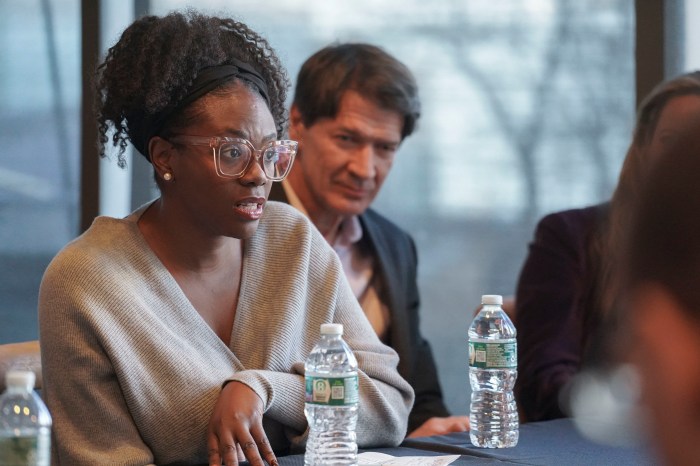Goodwill, a thrift store in Astoria, is one of…
By James DeWeese
What lies behind the cluttered storefront display of a Steinway Street thrift shop is the proverbial tip of a charitable iceberg that spans New York, all the country’s 50 states, and more than 20 countries.
Goodwill, a thrift store in Astoria, is one of 27 operated by the non-profit Goodwill Industries of Greater New York and Northern New Jersey in the Northeast, stretching from Northern New Jersey on up to the Canadian border. It is also the only one in Queens.
Each store is packed full with deeply discounted, donated items including clothing, housewares, books, furniture and even video games. Sales of these items help finance Goodwill’s vocational training programs for mentally disabled patients, after-school and summer youth activities and developmental therapy projects. Profits are also used to finance developmental and training programs for the company’s clients, as well as numerous community activities.
“I love any excuse to come out to the store,” said Alan Lidogoster, a Goodwill public relations officer and a former radio news writer. Lidogoster said he almost always finds something worthwhile.
At 3,000 square feet, the Astoria thrift shop ranks smaller than the usually 10,000-square-foot and larger stores the chain normally operates in more than 2,000 locations around the world.
But it still manages to do about $650,000 in business a year. And Lidogoster did not have any difficulty pointing out more than a few items suitable for a new apartment, including a shelving unit priced at a modest $20, in the basement of the store which contains housewares. Lamps, an answering machine and Slip’N Slides abounded, too.
Woman’s clothing takes up the first floor. “In some of our stores, I wouldn’t be surprised to find an Armani suit because our supporters come from all economic sectors,” said Mauricio Hernandez, of the company’s donated goods.
While most items are secondhand from private individuals, a number come from big-name companies that offer new products, Hernandez explained while pointing at a rack with women’s designer pants.
Some of the employees working in the shop are clients of Goodwill, which specializes in preparing mentally disabled people for the work force by recruiting, training and placing them.
Other clients participate in outsourcing programs — such as cable-splicing, clothing tagging and sorting — at Goodwill’s Northeastern headquarters in Two Coves.
“There is no dignity in handing people something. There’s a lot of dignity in teaching them something,” Hernandez said.
The Two Coves facility — which, apart from the executive offices, also houses a Family Learning Center with continuing education programs for the young and old — is where much of the clothing for the Manhattan stores gets sorted.
Most of the 2,000 plus stores in the network sort, price and sell their own donations. But for stores where space is an issue, particularly in New York where rents can be prohibitive, the charitable company has sorting centers.
Two Coves processes some 20,000 items a day, said Mary Cochran, senior vice president, an almost 40-year veteran of Goodwill and the first woman to participate in the executive training program.
You’ll find Goodwills in Astoria — destined for some minor renovations within the next few months, including new light fixtures, a good waxing for the floors and an updated layout — at 32-36 Steinway Street. You might have to look hard though; the Goodwill shop, which had its sign up for more than 10 years, got hit by the Department of Building’s recent awning crackdown.
Reach reporter James DeWeese by e-mail at news@timesledger.com, or call 718-229-0300, Ext. 157.


































